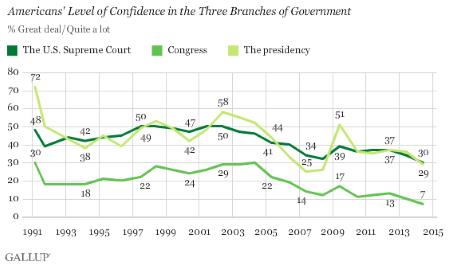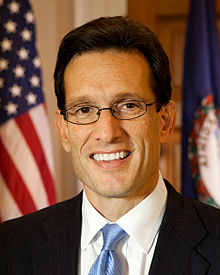 Since 1991, Gallup has been polling people on their opinions about the three branches of government: the Supreme Court, Congress, and the presidency. Today, it published data showing that the number of people who have confidence in the Supreme Court is at its lowest level ever: just 30%. This is still the highest of the three branches. The presidency gets 29% and Congress, of course, gets 7%. These data mean something, but they don’t mean what people think they mean.
Since 1991, Gallup has been polling people on their opinions about the three branches of government: the Supreme Court, Congress, and the presidency. Today, it published data showing that the number of people who have confidence in the Supreme Court is at its lowest level ever: just 30%. This is still the highest of the three branches. The presidency gets 29% and Congress, of course, gets 7%. These data mean something, but they don’t mean what people think they mean.
It most definitely doesn’t mean that the people are unhappy with the Congress or the Supreme Court or even the presidency. Going back 25 years, reported confidence in the Supreme Court and the presidency have always been pretty much exactly the same. And the reported confidence in Congress has always been about half whatever the presidency was. The only exception to this is the last couple of years when Congress has gotten even less popular. But even last year, although Congress was less than its usual one-half level, it was still more than one-third. This year, it is less than one-fourth, but I suspect this is just a statistical blip. In the coming years, it will come back up a bit.

What I find interesting is that from 2000 to 2001, the confidence in the Supreme Court actually went up a bit. This is after Bush v Gore, when most people were appalled by the clearly partisan decision where all the justices who voted Bush into the presidency were appointed by Republicans. I suspect that confidence went up because confidence went up in the presidency. And that has always amazed me: after allowing the most devastating attack on American soil, the “presidency” (not to mention the president himself) was rewarded with an increase in “confidence.” What’s with that?
Along the same lines, the people hated it when the House of Representatives impeached President Clinton. But confidence in Congress went up during that period. And it went up quite a lot: six percentage points, or roughly 30%. And why did it go up? Well, the economy was doing well. Confidence went up for the president and so it went up for Congress. It didn’t matter that Congress was doing stuff that the people thought was wrong.
Also, people may have no confidence in Congress, but term after term, they re-elect the same people. So as a practical matter, they aren’t too unhappy. If anything, they are unhappy that the rest of Congress does not do what their Representatives do. Regardless, what does the current 7% “confidence” number mean anyway. It means that conservatives are angry that Congress isn’t doing the incredibly damaging things they think are necessary to preserve freedom in America. And it means that liberals are angry that Congress isn’t doing anything good. So what?
Regardless, what the graph shows is that confidence in the presidency goes way up when the president starts a war. And then that confidence goes down whether the war continues or not. As Glenn Greenwald said, “Americans are quite good at regretting their past wars but quite poor at applying the lessons to newly proposed ones.” Other than that, we’ve seen pretty steady confidence in the presidency, except that Bush 43 was so bad that he created a new (lower) normal.
That’s the most you could say about these poll numbers. It isn’t that people do or don’t have confidence in these institutions. The numbers indicate how people feel about life in general. During the Clinton years as the economy improved, so did confidence. Then Bush came in and confidence went down until 9/11 and the Iraq War which pushed confidence really high because there’s nothing like incompetence and dishonesty to increase confidence. Then it went steadily down until Obama came in. Then confidence spiked—not because Obama was president, but because Bush wasn’t. And after the shine rubbed off, the presidency went down to a fairly constantly number. So it looks like Before Bush, confidence in the presidency was in the high 40s and after Bush, it was in the high 30s. I think we have bottomed out because this economic downturn has gone on so long. But a couple more years of growth and I think we will be back up to a confidence level of about 40%. If there is another Democratic presidency, it might get back to its old high 40s level.
Another aspect is that the coolness of cynicism changes over time. In the past, optimism and idealism were thought to be good things. Now, grousing about how terrible things are is the default for people. I see this all the time. Last week, I wrote, The Daily Show Fails on IRS—Again. I wrote, “I don’t like it when people claim that there is some big problem with the government bureaucracy.” It’s this generalized idea that the government is just crummy at everything it does. Actually, it was Reagan who really pushed that meme. If we had polling data going back further, I’m sure it would show a big decrease in the confidence level after him than before him.
But the truth is, when it comes to most government functions, things have gotten much better. But if you ask someone for a government bureaucracy that is bad, they always mention the DMV. Well, for one thing, the DMV is a state bureaucracy. But I always imagine that these people haven’t gone to the DMV since 1969. Because I’ve dealt with the DMV in three different states, and they’ve all done a great job.
So over time, confidence in the three branches of the federal government have gone down. It is also true that Americans’ confidence in just about every other institution has gone down. We’ve either become a more cynical people, or we’ve become the kind of people who think it is cool to be cynical. Regardless, it doesn’t say anything about our government institutions. And it only says a relatively small amount about the people who run those institutions.

 Last week, with the
Last week, with the  The conservatives on the bench are not idiots. They know that they can’t just say, “If an employer is religious, he doesn’t have to follow any law that goes against his conscience.” That would allow religions they don’t like to gain more power. Rastafarian employers might claim that all of their employees ingest cannabis. But even those Jehovah’s Witnesses: they can’t be allowed to sully the important legislative work being done by the conservative Christians on the Court: creating a special theocracy for their religion and their religion alone.
The conservatives on the bench are not idiots. They know that they can’t just say, “If an employer is religious, he doesn’t have to follow any law that goes against his conscience.” That would allow religions they don’t like to gain more power. Rastafarian employers might claim that all of their employees ingest cannabis. But even those Jehovah’s Witnesses: they can’t be allowed to sully the important legislative work being done by the conservative Christians on the Court: creating a special theocracy for their religion and their religion alone. Seth Masket
Seth Masket  I am still away from home, but I will be back later today and we’ll get back to normal around here! I have been working in and around the Bay Area this weekend, and it was Gay Pride weekend. That’s all fine, but the whole thing has turned from what was once an important political event to a great big party that draws people from all over the Bay Area. That’s great. I’m happy that gay rights are largely a non-political issue. But dealing with the crowds and all has been a total pain!
I am still away from home, but I will be back later today and we’ll get back to normal around here! I have been working in and around the Bay Area this weekend, and it was Gay Pride weekend. That’s all fine, but the whole thing has turned from what was once an important political event to a great big party that draws people from all over the Bay Area. That’s great. I’m happy that gay rights are largely a non-political issue. But dealing with the crowds and all has been a total pain! On this day in 1920, the great, great, great special effects artist
On this day in 1920, the great, great, great special effects artist  I have to go away for more testing of my high tech project. So there will be limited posting this weekend.
I have to go away for more testing of my high tech project. So there will be limited posting this weekend. 
 This last week was pretty good regarding the Supreme Court. As I
This last week was pretty good regarding the Supreme Court. As I  You all know how much we love reform conservatives around here, right? Or at least, you know how much we would love them if they existed. One of the people who claims to be for reforming the Republican Party but always comes up with a reason why actually, the Republican Party is just fine, is Ross Douthat. In Ryan Cooper’s excellent rundown,
You all know how much we love reform conservatives around here, right? Or at least, you know how much we would love them if they existed. One of the people who claims to be for reforming the Republican Party but always comes up with a reason why actually, the Republican Party is just fine, is Ross Douthat. In Ryan Cooper’s excellent rundown,  Okay. Let me say something nice about Douthat. He’s actually not that bad on economic issues. He’s a total social conservative, and in a man as young as he is, I think this really raises questions about someone screwing him up somewhere. But he isn’t one of the usual “screw the poor, love the rich” conservatives. If he really worked at by toning down the social conservatism a bit and revving up the economic liberalism, he’d be a populist. But I’m done now. That’s the last nice thing I’ll say about Ross Douthat.
Okay. Let me say something nice about Douthat. He’s actually not that bad on economic issues. He’s a total social conservative, and in a man as young as he is, I think this really raises questions about someone screwing him up somewhere. But he isn’t one of the usual “screw the poor, love the rich” conservatives. If he really worked at by toning down the social conservatism a bit and revving up the economic liberalism, he’d be a populist. But I’m done now. That’s the last nice thing I’ll say about Ross Douthat. You may wonder, how can this be? How can there be this win-win situation where we get a cleaner and safer environment while also creating jobs? Simple: not everyone wins. All those rich corporations that are sitting on piles of money that they don’t know what to do with? They are going to see those piles of money shrink. And that is why the Republicans are against doing anything about global warming or for that matter anything at all. They believe it is immoral to hurt the profits of any company by even the smallest amount. On the other hand, they don’t see it as immoral at all to keep many millions of people out of work unnecessarily. That’s the “free” marker!
You may wonder, how can this be? How can there be this win-win situation where we get a cleaner and safer environment while also creating jobs? Simple: not everyone wins. All those rich corporations that are sitting on piles of money that they don’t know what to do with? They are going to see those piles of money shrink. And that is why the Republicans are against doing anything about global warming or for that matter anything at all. They believe it is immoral to hurt the profits of any company by even the smallest amount. On the other hand, they don’t see it as immoral at all to keep many millions of people out of work unnecessarily. That’s the “free” marker! From obstructing a jobs bill to put Americans back to work in 2011, to derailing gun control measures any time they reached my desk, I feel blessed to have had such an incredible run of preventing productive policies, and even a few pieces of landmark legislation, from ever passing… Of course, I’m disappointed because I thought I had many more years of impeding accomplishments ahead of me, and I’ll be the first to admit that I never quite managed to stall environmental policies as much as I would have liked. But at the end of the day, I’m very proud of how I helped Congress accomplish so little during my time in office.
From obstructing a jobs bill to put Americans back to work in 2011, to derailing gun control measures any time they reached my desk, I feel blessed to have had such an incredible run of preventing productive policies, and even a few pieces of landmark legislation, from ever passing… Of course, I’m disappointed because I thought I had many more years of impeding accomplishments ahead of me, and I’ll be the first to admit that I never quite managed to stall environmental policies as much as I would have liked. But at the end of the day, I’m very proud of how I helped Congress accomplish so little during my time in office. In New York Magazine Jim Rutenberg has written a profile of disgraced and redemed Representative Mark Sanford,
In New York Magazine Jim Rutenberg has written a profile of disgraced and redemed Representative Mark Sanford,  On this day in 1872, the writer
On this day in 1872, the writer  Regular readers know that I’m a fan of Jonathan Chait’s writing. It isn’t so much that he’s insightful. He is, of course, often quite insightful. He is also, however, pigheaded about a few issues that he just can’t seem to get his head around. But what I most appreciate is his sense of humor and his great appreciation of hypocrisy. Today, he wrote an article that rather well sums up the latter part of that,
Regular readers know that I’m a fan of Jonathan Chait’s writing. It isn’t so much that he’s insightful. He is, of course, often quite insightful. He is also, however, pigheaded about a few issues that he just can’t seem to get his head around. But what I most appreciate is his sense of humor and his great appreciation of hypocrisy. Today, he wrote an article that rather well sums up the latter part of that,